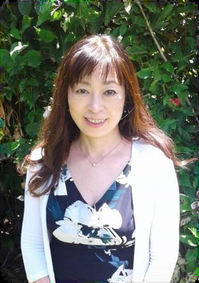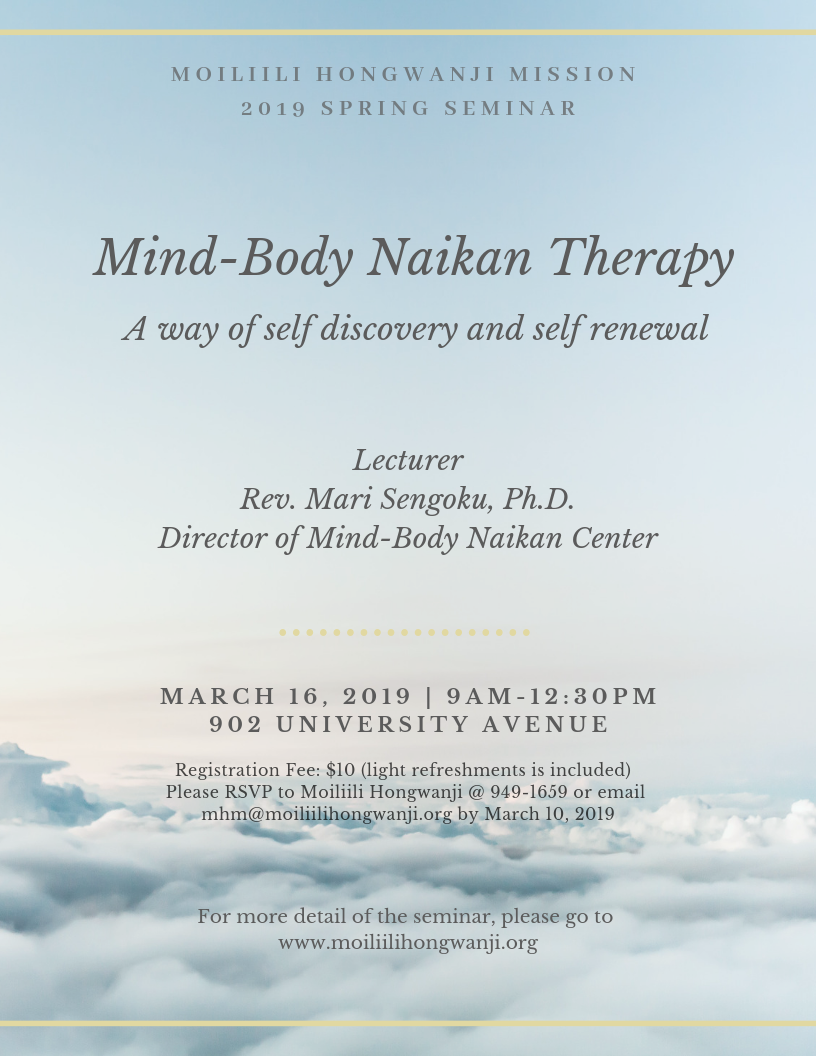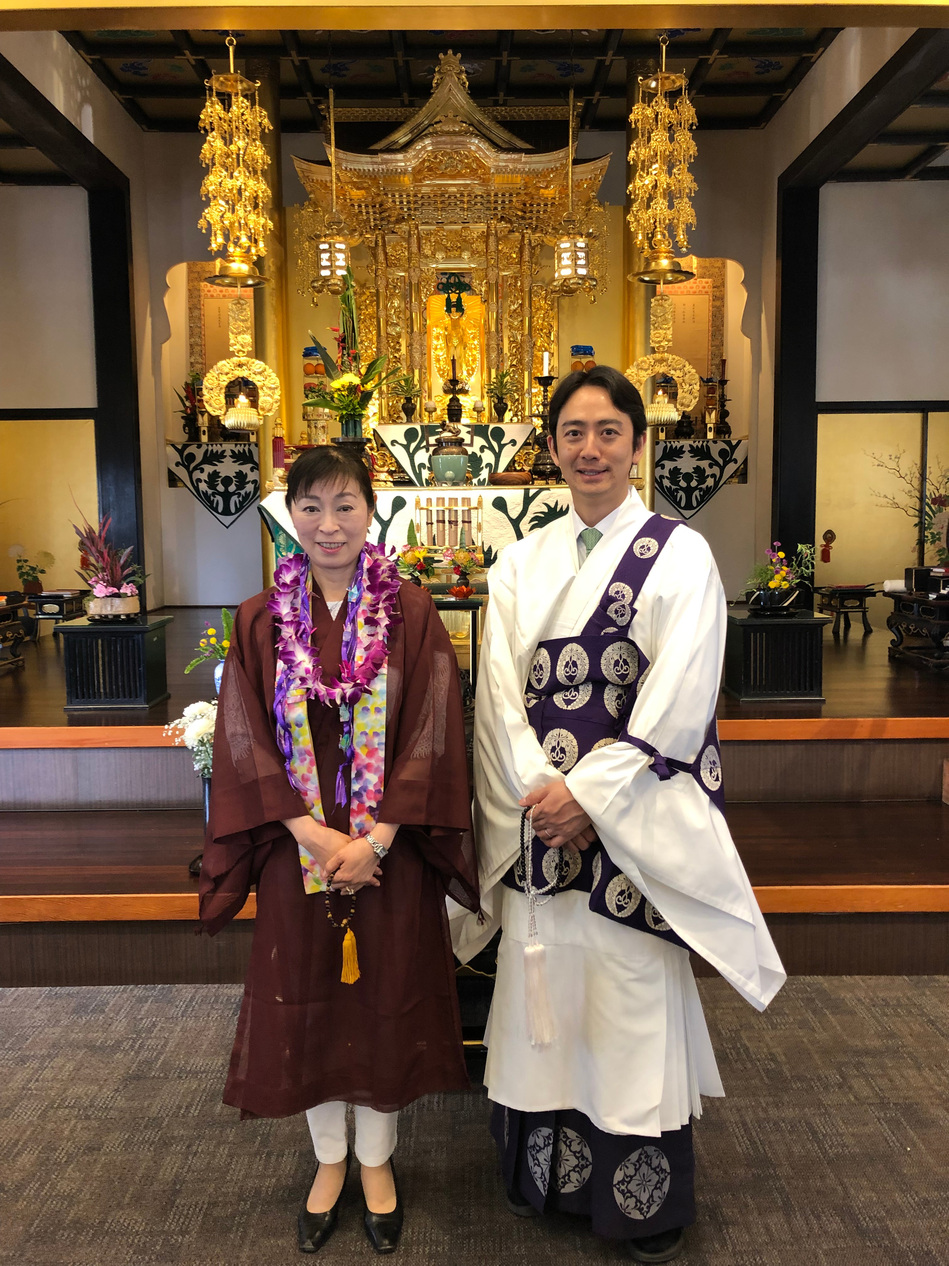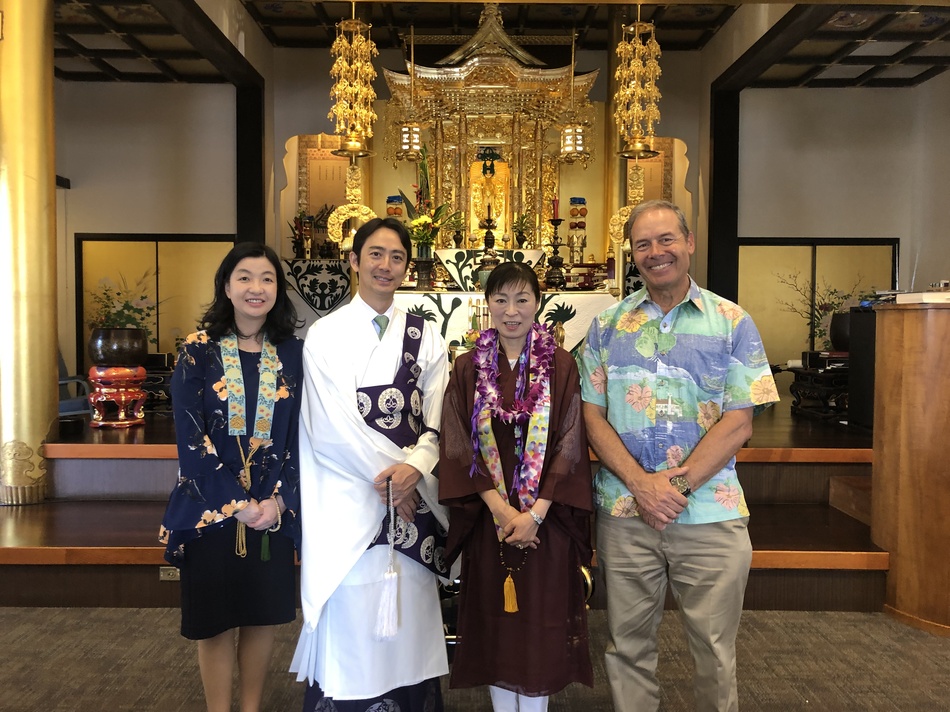2019年3月16日、ハワイホノルル、モイリリ本願寺にて 心身めざめ内観セミナーを開催いたしました。(お知らせ)|心身めざめ内観センター|内観心理療法、カウンセリング、気功、メデイテーション(呼吸瞑想法)、ヒーリングタッチ法(鳥取本部・米国ハワイ州オフィス)
- TOP:内観心理療法とは
- お知らせ
- 2019年3月16日、ハワイホノルル、モイリリ本願寺にて 心身めざめ内観セミナーを開催いたしました。
 2019年12月23日
2019年3月16日、ハワイホノルル、モイリリ本願寺にて 心身めざめ内観セミナーを開催いたしました。
2019年12月23日
2019年3月16日、ハワイホノルル、モイリリ本願寺にて 心身めざめ内観セミナーを開催いたしました。
MOILIILI HONGWANJI MISSION
2019 SPRING SEMINAR
Saturday, March 16, 2019
9:00am 12:30pm
Mind-Body Naikan Therapy
A way of self-discovery and self-renewal
Introduction to the Lecturer
 Rev. Mari Sengoku, Ph.D., is a Jodo Shin Buddhist minister who serves as a mental health therapist for temple members and members of the public in both Japan and the U.S. She used to serve as a minister of Honpa Hongwanji Mission of Hawaii (1994 to 2007). She has also served as a chaplain in hospitals and hospices in Kyoto and Tottori, Japan, as well as in Hawaii. She has an MA degree in Education and Marriage and Family Therapy in the U.S., and earned her Ph.D. in Neuropsychiatry in Japan. She regularly lectures about Japanese therapies and spirituality in university classes for foreign students in Japan, as well as at nursing and medical schools. Dr. Sengoku is the Director of Shinshin-Mezame Naikan Center, with locations in Tottori prefecture in Japan. Shinshin-Mezame means “mind-body awakening.” She guides her clients in breathing and meditation techniques to enable them to enter the deeper reaches of the Naikan experience promptly.
Rev. Mari Sengoku, Ph.D., is a Jodo Shin Buddhist minister who serves as a mental health therapist for temple members and members of the public in both Japan and the U.S. She used to serve as a minister of Honpa Hongwanji Mission of Hawaii (1994 to 2007). She has also served as a chaplain in hospitals and hospices in Kyoto and Tottori, Japan, as well as in Hawaii. She has an MA degree in Education and Marriage and Family Therapy in the U.S., and earned her Ph.D. in Neuropsychiatry in Japan. She regularly lectures about Japanese therapies and spirituality in university classes for foreign students in Japan, as well as at nursing and medical schools. Dr. Sengoku is the Director of Shinshin-Mezame Naikan Center, with locations in Tottori prefecture in Japan. Shinshin-Mezame means “mind-body awakening.” She guides her clients in breathing and meditation techniques to enable them to enter the deeper reaches of the Naikan experience promptly.
What is Naikan?
Naikan is a Japanese word which means “inside looking” or “introspection.” Naikan is a method of meditative self-reflection, psychotherapy and counseling founded in 1950s by Rev. Ishin Yoshimoto - a Jodo Shin Buddhist minister. Now there are more than 40 Naikan centers in Japan, and the therapy has also taken root in the U.S., China, and Europe, with Naikan centers now established in Austria, Germany, China and Korea. Also in Sri Lanka, Dr. Sengoku and Theravada Buddhist monks at universities are in planning Naikan retreat and research project. In Naikan, the practitioner devotes oneself to self-examination on the following three themes: 1 – What you have received from others; 2 – What you have returned to others; 3 – What troubles and difficulties you have caused in relation to significant people in your life, beginning with your mother, father, and spouse, and continuing on to others. These relationships are examined by first dividing them into chronological order, then by putting yourself in the other’s shoes, and then by trying to recall concrete facts. Naikan gives a practitioner an opportunity to examine things objectively. As a result, practitioners become able to reinterpret and change their perspective toward the significant relationships in their lives. They come to discard narrow and self-serving points of view, and instead cultivate deeper understandings of self and other rooted in gratitude and an awareness of interdependence. This discovery can be profoundly transformative, leading to the resolution of problems and to the improvement of disease.
As Jodo Shin Buddhist followers, through reflecting on our relationships with others using Naikan themes, we attain insight into the basic notion of Jodo Shin Buddhist teachings based on the works of Shinran Shonin (1173-1263) including how our life is supported by other through “interdependence” (engi, jinen), the absolute grace of tariki or “other power,” liberation from ego-centered existence and realization of “no-self” or “non-ego” (muga). These insights into interdependence, other-power grace, and selflessness in turn generate deep feelings of gratitude and appreciation for others, feeling of repentance for causing trouble to others and feelings of “compassion” (jihi) for others.
Finally, the applications and objectives of Naikan are clarified as follows:
(1) First, Naikan is a spiritual way of transformation, illumination and enlightenment based on Jodo Shin Buddhist teachings which can be used by students, teachers, doctors, nurses, businessmen, homemakers, and so forth; (2) Second, Naikan is a psychotherapy and counseling method for those suffering from marital conflicts, juvenile delinquency, school truancy, alcohol or drug dependency, criminal behavior, neurosis, depressive disorders, and other psychological problems.
In conclusion, we might say Naikan is a kind of secular hoben or “expedient means” for getting insight into Jodo Shin Buddhist principles operating in everyday life.
Seminar Schedule
| 9:00am – 9:10am | Opening, Itroduction |
| 9:10am – 9:50am | Lecture: Introduction to Naikan Therapy (40 min.) |
| 9:50am – 10:10am | Break (20 min.) |
| 10:10am – 12:10pm | Experiencing Naikan followed by Chair Yoga stretch and Breathing technique (120 min.) |
| 12:10pm – 12:30pm | Q&A Discussion, Closing |
主催者の梅谷先生ご夫妻たちと
ワークショップの英語の感想と日本語の概ねの訳は以下の通りです。
- Subject matter can be incorporated into all aspects of life. E.g. at home, at work (interacting with others) and school/public etc.
- Amazing how Naikan and Jodo Shinshu was related.
- This seminar was “eye-opening”. Many things we take for granted.
- The speaker, Dr. Sengoku, was very clear and interesting in her explanation. She is knowledgeable about the topic as well as Shin Buddhism.
- I feel that the presentation was excellent. The talk was clear and the breathing experience was superb.
- I don’t mind sitting and participating all day.
- Inform when opportunity to participate in training at St. Anthony becomes available.
- Excellent! Doing exercises together provided a wonderful experience. The music was very helpful and beautiful.
- Time well spent. Need follow up seminars.
- Please keep your contact with Honpa Hongwanji Hawaii Kyodan.
- Very interesting method of practicing gratitude and how it shapes your own physical self.
- Suggest that you start a Naikan practice here.
- The speaker brought together many concepts of self-reflection. I have done yoga and meditation in the past, and this brings it all together.
- Very enjoyable.
- Rev. Sengoku explained in detail the Naikan way of life, compassion, and gratitude.
- This was fascinating and inspiring – I will use it!
- Naikan 2, please.
- Hope more options to resources in English.
- I was interested in finding out about Naikan therapy. I was happy to find it offered here.
- I greatly enjoyed learning about a form of treatment which engages with Japanese culture.
- Need more seminars like this when possible.
- Excellent session!! I learned of this form of therapy from a book. It was great to participate and learn firsthand.
- Excellent presentation. Clearly explained. Informative and entertaining.
- Bring her back again, please!
- 内観は自宅や教育、医療の現場など、あらゆる場所に適応されるとわかった。
- 今回のセミナーは本当に目からうろこ。自分は色んなことを、あたりまえだと思って生きてきたことがわかった。
- とても分りやすい内容だったし、呼吸法は気持ちがすっきりした。
- 自己反省法にヨガ、気功がみごとに導入されていた。
- 内観療法についてずっと知りたいと思っていたので、とても役に立つセミナーだった。
- 内観について知識としてはあったが、実践として学べて良かった。
- 次のセミナーがまちどおしい。





